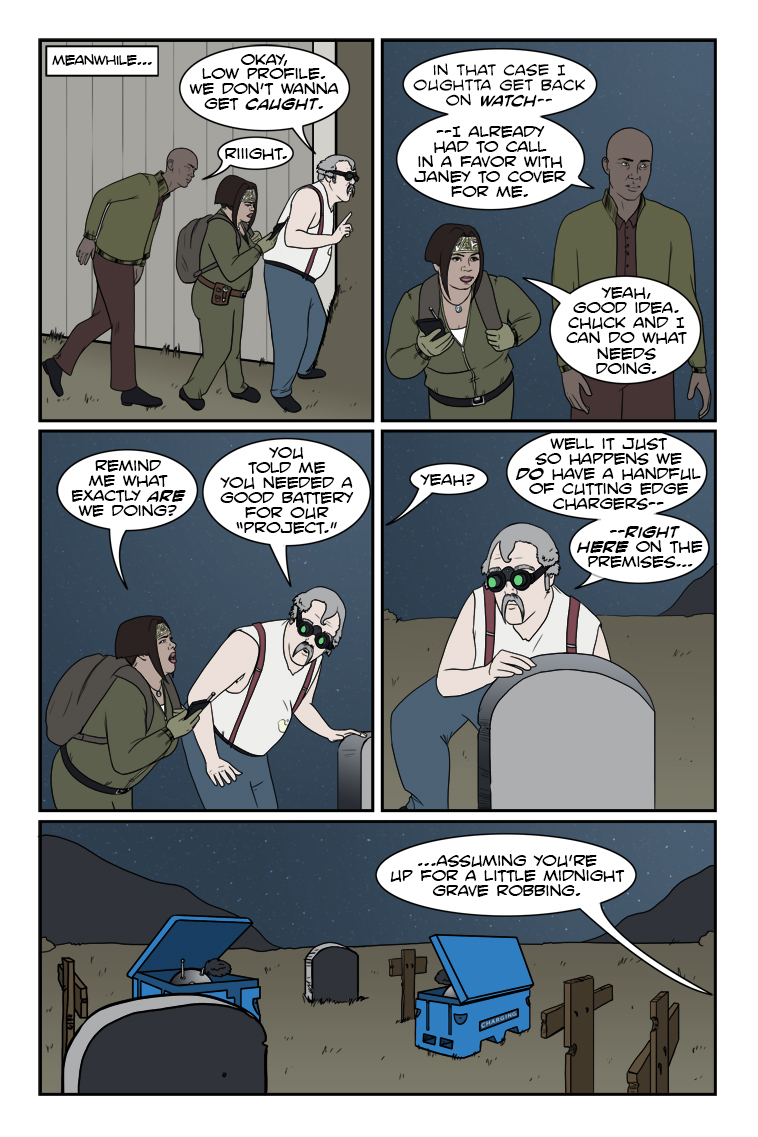Cart
Product categories
Support Us!
If you like what I do please support us on Ko-fi or Patreon.
Follow Us!
Join Our Newsletter!
Vote For Us!
Login
Polls
Events
-
Pasadena Comic Con
Dates: May 24
Location: Pasadena Convention Center, 300 E Green St, Pasadena, CA 91101, USA ( MAP)Details:We will be at the Pasadena Comic Con on January 26th. See some of you there for this one day event!
Purchase tickets online at here: https://www.tixr.com/groups/pcc/events/pasadenacomiccon-pasadena-comic-con-2025-115248
-
San Diego Comic Con: SP-N7
Dates: Jul 23 - 27
Location: San Diego Convention Center, 111 Harbor Dr, San Diego, CA 92101, USA ( MAP)Details:Clint & Dawn Wolf will be at San Diego Comic Con, as Lab Reject Studios. We will be at booth N7 in Small Press.









6 thoughts on “541 – Graverobbers”
Crazyman
“Oh, *that* kind of grave robbing? Lead on, Chuck!” 😈
Dr. Norman (not a real doctor)
What? I say “What”?
Keith
Heh, this is going to be fun. Tradition says you need to drink at least one bottle of MD 20/20 before going to the graveyard.
Honzinator
At first I was thinking of something like a potato battery … nope!
Scarsdale
If you take a dead “D” cell battery, take out the carbon rod from the center, cut a strip of galvanized sheet metal about an inch (2.7 centimeters), take a small jar for canning, suspend the rod in the center and the strip on the side, pour in drain cleaner, you’ll get 1.2 to 1.4 volts DC. 10 of those connected to an inverter will give you 120 VAC at 0.5 amps. Do NOT keep them in the same area you live in however, the fumes will burn your lungs. Just something I learned in chem class in high school. You’d have to top-up the jars every few days, however. Any type of acid will work, even salt water. I think the teacher was a survivalist…
nbaldbiz
Scheffler, Hovland and Conners Share the Lead at P.G.A. Championship
Jordan Spieth, who needs a victory at Oak Hill to complete the career Grand Slam, and Justin Thomas, who won last year’s tournament, just made the cut at five over.
Give this article
Latest Comics
#243. 233 – Dead River
14 Nov 19, 2014
#242. 232 – Gate Expectations
14 Nov 12, 2014
#241. 231 – Unskilled Labor
14 Nov 05, 2014
#240. 230 – Undeath And Taxes
13 Oct 29, 2014
#239. 229 – Rancher’s Answer
13 Oct 22, 2014
#238. 228 – Unintentional Roughness
14 Oct 15, 2014
#237. 227 – Flyaway Blues
15 Oct 08, 2014
#236. 226 – The Sky’s The Limit
14 Oct 01, 2014
#235. 225 – Transportation Breakdown
45 Sep 24, 2014
#234. 224 – Time To Get High
46 Sep 17, 2014
#233. EPISODE TEN
56 Sep 15, 2014
#232. 223 – Surrounded (END OF EPISODE 9)
45 Aug 27, 2014
#231. 222 – Network Overhead
49 Aug 20, 2014
#230. 221 – This Hat Remembers Him
13 Aug 13, 2014
#229. 220 – Cope Springs Eternal
16 Aug 06, 2014
#228. 219 – Rejection Notice
15 Jul 16, 2014
#227. 218 – Property And Loss
16 Jul 09, 2014
#226. 217 – Out Of Focus
17 Jul 02, 2014
#225. 216 – Red Eyes At Mourning
13 Jun 25, 2014
#224. 215 – Grave Matters
13 Jun 18, 2014
Latest Chapters
Episode 22
Episode 21
Episode 20
Episode 19
Episode 18
Episode 17
541 – Graverobbers
WonderCon 2025 is coming soon, so the next comic is planned for April 9th.
In the meantime, relevant previousness for this week's page:
https://www.zombieranchcomic.com/comic/223-surrounded-by-film-end-of-episode-9/
https://www.zombieranchcomic.com/comic/483-solar-systems/
Scents and sensibility
Calendar
BlueSky Latest Posts
Writer’s Blog Archives